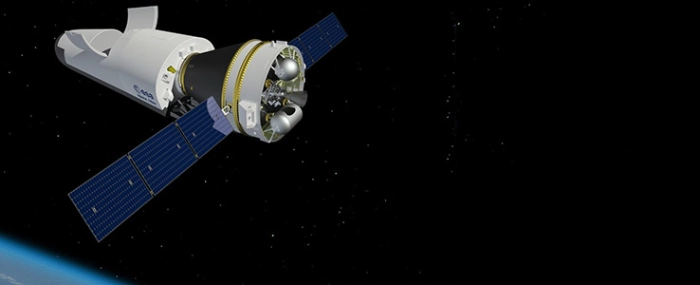
© ESA / Jacky Huart
Electronics Production |
Alenia Space gets Space Rider development contract
Thales Alenia Space (Thales 67%, Leonardo 33%), with co-contractor ELV (European Launch Vehicle 70%, Avio SpA 30%, AVI) has signed a contract with the European Space Agency for the engineering and preliminary development of the automated reusable Space Rider transportation system.
The goal of Space Rider is to provide Europe with an affordable, independent, reusable end-to-end integrated space transportation system for unmanned missions and for routine access and return from low orbit. It will be used to transport a variety of payloads into different LEO (low Earth orbit) altitudes and inclinations.
Featuring a lifting body configuration, Space Rider is designed as a free-flying orbital platform, capable of remaining two months in orbit, safely reentering the atmosphere and landing. It can be recovered along with its payload, refurbished, and reused for up to six missions. It combines the characteristics of a space system designed for scientific experiments in low Earth orbit with those needed for guidance outside the atmosphere and through an automated landing, including microgravity experiments, in-orbit validations, testing of science and exploration technologies, etc., plus payload recovery on the ground for examination and retesting.
It follows ESA’s Intermediate eXperimental Vehicle (IXV) which on 11 February 2015 performed a flawless suborbital flight with atmospheric reentry and sea landing.
Leading a consortium of European manufacturers, research centres and universities, Thales Alenia Space is responsible for the development of the reentry module (RM), derived from the IXV. ELV is in charge of the development of the service module, derived from the Vega C upper stage AVUM (Attitude and Vernier Upper Module). The partners in this new program are capitalising on the lessons learned from the IXV, which enjoyed strong support from the Italian space agency ASI.
“For Europe, Space Rider represents a major step forward in our reentry vehicle road map,” said Donato Amoroso, CEO of Thales Alenia Space Italy. “It will be reusable, paving the way to larger and more challenging applications, including reusable stages, point-to-point flights, spaceplanes and even space tourism. The contract signed today confirms Thales Alenia Space’s leading role in atmospheric reentry, since it combines the capabilities of orbital free-flying satellite platforms with reusability.”

